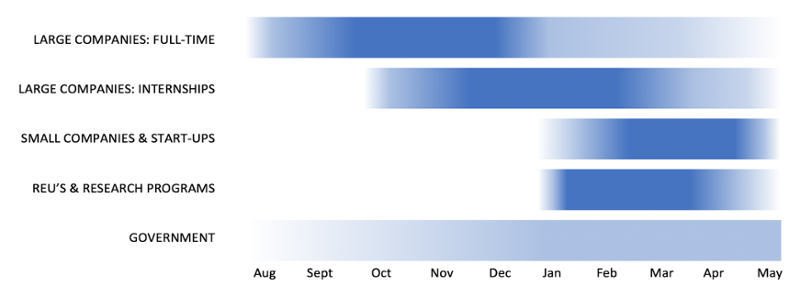Explore a career in Engineering.
Engineering is the application of scientific, social and practical knowledge to solve current and future problems. Your specific engineering major doesn’t necessarily determine your job title in your industry of choice. Engineering is an interdisciplinary field, and it’s worth exploring your specific interests and talents!
-
Sample Job Areas
- Application and field engineering: Design, development, and implementation of technical programs and training for customers
- Audio engineering: Technical aspects of sound during recording, mixing, and reproduction
- Broadcast engineering: Use and maintenance of hardware systems used across television, radio, and new media
- Clinical engineering: Design, maintenance, and repair of diagnostic equipment and medical devices in collaboration with medical professionals and scientists
- Design: Use of technical tools such as computer-aided design to create or improve products and systems
- Manufacturing engineering: Design and implementation of methods to turn raw materials into products efficiently
- Modeling and simulation: Use of simulation technologies to test performance, durability, safety, and functionality of engineering solutions
- Process engineering: Development and/or modification of industrial processes, manufacturing plants, and equipment
- Product engineering: Collaboration with research and development, marketing, and sales teams to introduce competitive products into the market
- Project engineering: Planning of schedules and resources to complete complex engineering projects
- Quality engineering: Measurement, testing, and assurance of product quality
- Research and development: Innovation of new technologies, processes, and methods; development of experiments and prototypes
- Systems engineering: Design and management of complex systems over their life cycles.
- Validation and test engineering: Testing, measurement, and calibration of systems used to develop or manufacture products
- Robotics: deals with the design, construction, operation, and application of robots
-
Recruiting Timelines
Employers recruit and hire according to specific cycles that vary by employer and opportunity type. By understanding and adapting your job or internship search strategy to the industry’s recruiting timeline, you are putting yourself in the best position to secure a full-time or summer position.
The graphic below details when employers of differing types and sizes hire throughout the year. The darker areas indicate a higher level of recruiting activity, which is when you can expect most applications to open and close.

Key:
- Large companies: 1000+ employees, public or private
- Small companies and start-ups: Fewer than 250 employees, public or private
- Mid-size companies: May hire on either timeline, depending on the employer
- REUs: Research Experiences for Undergraduates, competitive opportunities for summer research, mainly in academia, funded by the National Science Foundation
- Government agencies: Federal, state and local
-
Candidate Profile
Check out the career competencies to understand the skills that will make you career ready!
Technical Skills
- Abilities and knowledge acquired through class work, research, internships, and independent projects
- Relevant coding and software skills
- Hands-on skills such as laboratory techniques, equipment, machine shop, etc.
Communication Skills
- Proficiency in written, oral, and electronic communication
- Skills in addressing multiple audiences, including peers, management, and clients
- Ability to communicate technical concepts in an accessible way to non-technical audiences
Problem Solving and Critical Thinking
- Skills in identifying, assessing, and analyzing complex problems
- Ability to organize one’s thoughts and present a well-reasoned argument
Teamwork, Leadership and Interpersonal Skills
- Demonstrated experience as an effective member of a team or group leader
- Conflict resolution skills
Academic Achievement
- 3.0 minimum GPA is typical for competitive opportunities












